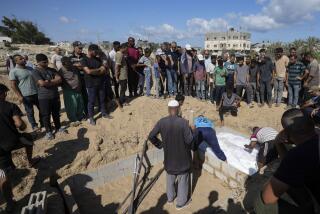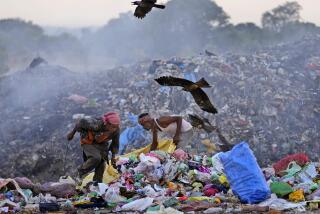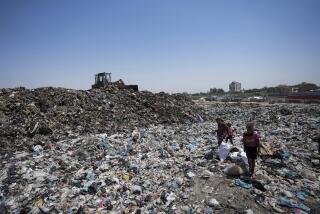Trash Patrol Part of Security Forces’ Beat in Iraqi Capital
BAGHDAD — On these streets, even the garbage can kill.
On Saturday, like many days, Iraqi army and police forces patrolled in trucks and Humvees with cracked windshields and bullet nicks, hunting militants and giving cover to trash collectors who feared bombs tucked in milk cartons, Coke cans and crumpled newspapers.
“The terrorists exploit any chance to inflict civilian casualties,” said Iraqi Brig. Gen. Qassim Musawi. “They target the water supply, electricity, infrastructure, everything including the trash. They look for any gap to kill as many civilians as they can.”
The trash patrol is another duty for Iraqi security forces in a city where hidden dangers burst with incredible speed and viciousness from alleys and street corners. At least 316 Baghdad municipal workers have been killed in the last six months. Garbage collectors are often targeted; six were blown up by exploding garbage bags in a predominantly Sunni Arab northeast neighborhood known as Raghiba Khatoon.
There’s a fine, almost imperceptible line in Iraq between what is safe and what is not. As the trash was gathered Saturday, sectarian killings continued across the country.
In Muqdadiya, northeast of Baghdad, 11 bodies were found scattered throughout the city. They were identified as two police officers and nine members of a Shiite Muslim tribe. Five civilians were killed and 22 injured in two car bomb attacks in the northern city of Kirkuk.
The western regional commander of the Iraqi Border Protection Force, Brig. Gen. Jawad Hadi Selawi, was shot dead while driving alone in his car in Karbala, about 60 miles south of Baghdad, police said.
Fifty gunmen surrounded and rained mortar rounds on a small, predominantly Shiite neighborhood in Baqubah, where violence has markedly increased between Sunni and Shiite tribes. The militants fought with police and skirmishes erupted in the streets.
In Samarra, where the bombing of a revered Shiite shrine in February ignited sectarian hostilities, a Sunni cleric was slain.
Items like these -- a few sentences, some numbers, bits of description -- are reported daily in Iraq, lingering in the news until details of another killing or firefight somewhere else arrive to replace them.
Iraqi and U.S. forces have been unable to stop the incessant violence and often suffer casualties themselves. Four Americans were killed over two days, including three Marines in the Sunni stronghold of Al Anbar province, according to a military statement released Saturday.
In an attempt to gain control of a worsening security situation, the U.S. is planning to increase the number of troops in Baghdad from 9,000 to 13,000, including members of the 172nd Stryker Brigade Combat Team. Joint squads of U.S. and Iraqi soldiers will attempt to flush militants and sectarian death squads from lawless neighborhoods.
Bombs, mortar rounds and gunfire daily rattle windows and doors across the city. Six laborers waiting for jobs in Tayaran Square on Saturday were wounded when a bomb exploded. A roadside bomb injured three policemen in northern Baghdad. Some Iraqis can no longer endure the violence around them.
Iraqi sporting officials announced that Akram Ahmed Salman, the national soccer coach, had submitted his resignation Friday. Coaches and athletes have been under intense pressure since the July 13 killing of the country’s wrestling coach and the subsequent kidnapping of 30 sporting officials. About 10 have been freed.
The Associated Press quoted an Iraqi soccer federation official as saying that Salman resigned after receiving an anonymous threat that went like this: “We know you, your family members and your address. Quit training the Iraqi soccer team, otherwise you’ll all be eliminated.”
Gen. Musawi said that sometimes soldiers in fatigues and police officers in uniforms helped collect the trash, using their trucks and equipment to clear piles of bags from neighborhoods that have only a few hours of electricity each day.
“The municipality doesn’t have enough vehicles to cover the whole city,” he said. “Besides, the quantity of garbage is a lot, so we have to help.”
The fight for his country, said Musawi, comes down to Baghdad.
“The terrorists are concentrating now and in the future on Baghdad,” he said. “Our mission is big ... to be victorious in Baghdad means to achieve victory in Iraq.”
Staff writer Raheem Salman and Saif Rasheed in Baghdad and special correspondents in Kirkuk and Baqubah contributed to this report.
More to Read
Sign up for Essential California
The most important California stories and recommendations in your inbox every morning.
You may occasionally receive promotional content from the Los Angeles Times.











